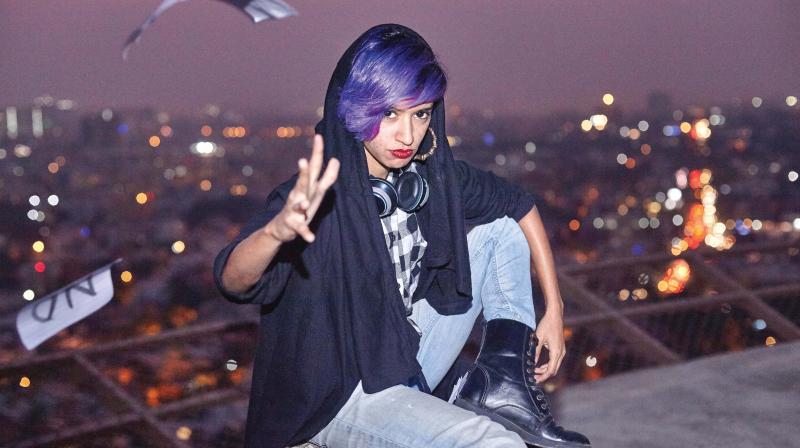From wraps to rap music
Sofia Ashraf's transformation from an Orthodox hijabi to an outspoken rapper is an inspiring journey for girls.

Step by step, it happened. Not as an overnight conversion. What has remained common before and after was her love for writing. Sofia Ashraf is driving on Sunday night, speaking between a breaking connection and a crazy Chennai traffic. There’s little not written about her — the Orthodox Muslim background, the giving up of religion, the protest rap songs that made her popular. What’s less said is perhaps that her family is from Kannur, and she is a Malayali.
“But mom was brought up in Chennai. I used to visit Kannur once a year,” she says. “I grew up in a very orthodox household. But as most Kerala families do, they taught me to question things. Individuality was instilled in me from a very young age.” The hijab had stayed with her as her belief and her heritage. Her first rap on stage was in fact as a hijab-wearing college student in Chennai, singing about her identity as a hijabi. “You write about what matters to you. I love writing and music. So I combined my poetry and rap singing.” She chose rap because, she says modestly, she can't sing.
Hard to believe that having heard not just her rap protests, but also the songs she’s sung with Suren for the band Mallipoo & The Alwas. ‘Stuck with you’ especially comes with a beautiful tune.
“Besides, musical instruments were banned in my house,” she goes back to her childhood. There were a lot of these conditions that stopped her. She was interested in sports but religion didn’t allow her to perform in a co-ed school in public. She used to be a dancer, choreographer. And she had to give it up for the sake of religion. “I denied myself a lot of opportunities for a long time.” Not that she had a lot of trouble back then, for she too had been a staunch believer. She was running an Islamic youth group during her college days. “There were these weekend classes, and we’d all research on a subject. A lot of women had looked up to me. It was a blow to them when I gave up religion.”
It was not easy for Sofia either. But she started looking at religion from a theological, historical, philosophical and economic point of view and got to a point when her earlier beliefs didn’t make sense. “Till 22, I was very orthodox. I agreed for an arranged marriage and I was engaged!” Her family thought that this was a phase and she would get over it. But Sofia didn’t. She went on to pick up issues she felt strongly about. These turned out to be ones where society tried to force ideas down people's throat. Issues like moral policing. “My association with the Vettiver Collective introduced me to music, they said I can rap about anything I want.” The collective has a show called Justice Rocks, promoting protest songs, like the one where T.M. Krishna has recently rendered his Porambokku song.
The song that made Sofia famous — Kodaikanal Won’t — had a second version recently, Kodaikanal Still Won’t. In that she uses spoken word as a medium. “People know me as this rapper but I am a content creator. Rap is a medium. Spoken word is another. Nursery rhyme is a third.” That last one is Marathai vetti kooda, which is her mom's favourite. “There is this one thing that Indian mothers do to their daughters. They don’t allow their daughters to dream. Because they know that you live in such a patriarchal society that eventually the daughter’s dream will be smashed. So they think the way to protect her from a broken dream is not to let her dream at all. So from a very young age my mom would tell me ‘you will get married, you won’t get to do that this, this is your life’. She told me that to protect me. For me it was very suffocating. I didn’t like my talent having an expiry date.”
Today her mother is very proud of her. “We have mutual respect. As long as I don’t interfere in the beliefs of my mother and sister, they won't interfere in mine.” Her mother loved the recently popular song ‘But mole, is there good news’ that Sofia has sung as a conversation between a mother and a daughter. The daughter keeps singing about the many achievements she’s made but the mother keeps asking, 'But mole, is there good news’, referring to child birth. Like Sofia’s mom, her relatives too surprised her with their belief in her. “There are very religious fundamentalist relatives who have come up to me and said they are very proud of me.”
No wonder there. Sofia’s rap spread so far that people in London did a flash mob with her song for the Commonwealth Games where Dow Chemicals was one of the sponsors. Sofia had made a song against the company to compensate for the Bhopal Tragedy. Her Kodai song too got so much attention that it resulted in the company (Unilever) paying compensation to 519 employees. Sofia is now writing a children’s book with a strong female character — “There will also be a TV show with a strong all-girl lead.”

